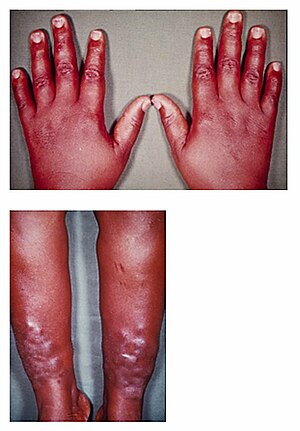Ever wonder why your salt is iodized?

- Image via Wikipedia
This woman has a humongous goiter, probably due to lack of dietary iodine. I’ve never actually seen a goiter caused by iodine deficiency, and I’ve certainly never seen one this large. Any doctor would have treated her long before things got this bad. Iodine deficiency is not the only cause of goiter, however. A symmetric swelling like hers could be due to primary hypothyroidism as well.
Unlike the first image, the lady below has an asymmetric goiter, off to her right side, but still fairly huge. This raises a concern for tumor or cyst in addition to the question of iodine deficiency or simple hypothyroidism.
- Image via Wikipedia
In America doctors rarely see patients with extremely large goiters or advanced hypothyroidism. These two ladies probably have additional findings, such as swelling of the hands or legs (myxedema) and feeling cold.

Interestingly, neither woman is overweight. Americans suffering from low thyroid usually gain weight due to slowed metabolism (and too much food). Additionally, since goiter can also be caused by overactive thyroid, and since I don’t have the medical history on these women, they could have either low or high thyroid. Both are thin enough to suspect overactive thyroid, but neither demonstrates the typical bulging eyes. My guess is they both have low thyroid and don’t live in conditions leading to weight gain.
Most patients who take medication for thyroid disease are taking Synthroid or generic equivalent. In the case of thyroid medication, although generic is cheaper, it’s not always advisable. Here’s why: whereas brand name medication must contain +/- 5% of the specified dose, generic equivalents need only be as accurate as +/- 20%. So if your doctor orders 100 micrograms of levothyroxine, you would be assured of getting between 95-105 mcg. of medication if you receive brand-name Synthroid, but anywhere from 80-125 mcg. if your receive a generic drug. In many instances, a partially-functioning thyroid will compensate for a slightly fluctuating dosage. However, a patient with no functioning thyroid tissue may notice a difference. Since name brand medicine is only about $25 a month (versus $4 to $15 for generic), it may not be worth it to get generic. If you require additional blood tests, you’ve eaten up your savings.
Depending on the patient, my approach is often to try a generic. If the TSH (thyroid stimulating hormone) level is stable, I continue the generic. If not, we go with brand-name Synthroid. Even then, TSH levels sometimes vary, due to varying disease activity in the case of auto-immune thyroid conditions. More common than this, I believe, is that levels vary because patients become lax about skipping the medication occasionally. When skipping a day doesn’t change how you feel, patients sometimes wonder if they really need daily medication. But if you forget your medicine 10% of the time, blood tests may indicate you need more medicine, and then your doctor will want to repeat the blood tests. All in all, it’s cheaper to just take the medicine every day, especially for the month before your bloodwork is due.
And one last thought, if your TSH is only a few points higher than the normal range, ask your doctor whether medication is definitely indicated. If you were diagnosed with low thyroid because you are tired, treating hypothyroidism may not relieve your symptoms. Generally speaking, although your brain is producing more thyroid stimulating hormone to rev up your thyroid, the circulating amount of thyroid hormone may well be normal, and therefore not the cause of your fatigue.
The decision whether to treat is not carved in stone. For a scientific discussion of the factors influencing this decision, read http://www.aafp.org/afp/2008/0401/p953.html.
© Cynthia J Koelker, MD – All rights reserved
http://www.101waystosavemoneyonhealthcare.com/

Related articles by Zemanta
- Goiter – simple – All Information (umm.edu)
- Graves disease – All Information (umm.edu)




Do you know of any herbal or other non-prescription remedies in the event that levoxyl is not available? Can animal thyroid be processed by laypersons?
Hi Addie,
For a partial answer, see: http://armageddonmedicine.net/?p=92.
Yes, animal thyroid can be used, but dosing would require careful titrating. I’m working on a longer answer, and still have plans to visit a butcher. There have been cases of accidental hyperthyroidism (high thyroid) from patients who inadvertently ingested cow thyroid tissue. Keep tuned for a more complete answer.